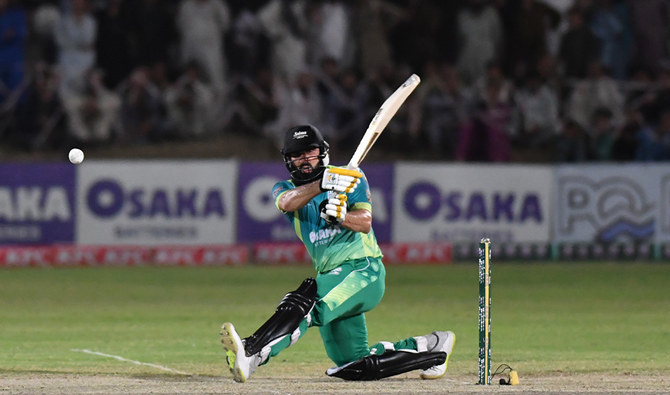KARACHI: It was the last ball of the first innings, and the excitement in the stadium was palpable.
Misbah-ul-Haq, a former skipper of Pakistan’s national cricket team, hit the ball out of the boundary as the audience burst into applause.
All around the sparkling cricket pitch, the stands were full of men, women and children who had arrived from all over Pakistan’s teeming port city of Karachi to the Naya Nazimabad cricket stadium in Mangophir, a neighborhood once overrun by Taliban militants and notorious for target killings.
Since a paramilitary crackdown against insurgents and criminals launched in September 2013, normalcy has returned to the area and today, it is the site of nail-biting night cricket tournament where locals come out to watch their cricketing heroes and cheer on their favorite teams.

Night Ramadan matches at New Nazimabad cricket stadium are shoot with 16 cameras, including two drones, organizer Sikandar Bakht told Arab News on May 15, 2019 (AN Photo by Shakil Adil)
“This tournament has been held for the last seven years, but no international (level) players have come to play before; even local players used to come amid tightened security,” Sikandar Bakht, the tournament organizer, told Arab News during a match last week.
He pointed at the swarm of cheering fans: “You couldn’t imagine this kind of crowd,” he said.
The stadium is a few hundred yards away from Sultanabad, for years illegally encroached by the Taliban and infamous for groups of militants and criminals whizzing through the streets on their motorcycles every night hurling hand grenades into homes. Even the local police station was locked up and abandoned for years.

Street vendor Ilyas Khan rides a customized bike at the New Nazimabad Gymkhana where a Ramadan night tournament is underway on May 15, 2019 (AN Photo by Shakil Adil)
At the peak of the violence in Karachi, between 2012 and 2013, almost ninety people were murdered due to political violence in Sultanabad alone, their bodies discovered near a junction called ‘Medina Bakery’ a few kilometers from the Naya Nazimabad stadium, plush under the floodlights and choke full of cricket fans.
As cricket-fever sweeps across the country ahead of the 2019 ICC World Cup which kicks off later this month, almost all of Pakistan’s first-class cricketers, except those currently in England for the one day internationals and the World Cup, will be playing in Sultanabad every night until the final match on May 26.
The roster includes names like Misbah-ul-Haq, Kamran Akmal, Umar Akmal, Imran Nazir, Shaan Masood and Mohammad Sami, among a dozen others.
“I’m happy that Ramadan night matches have made it to big grounds where major names from international and first class cricket are playing,” Anwar Ali, a popular Pakistani fast bowler, told Arab News.

Little children are seen playing on the sidelines of a Ramadan tournament at the New Nazimabad cricket on May 15, 2019 (AN Photo by Shakil Adil)
The tournament which is being telecast on national television will see the winning team win around $8,000 after the final match. One fan from the audience wins a motorcycle every time there’s a catch on the field.
For the inhabitants of Mangophir, the return to normalcy after years of violence still feels relatively new.
“It was never like this before,” said Afrooz Shakeel who lives near the stadium. and had brought her children and grandchildren to the game after preparing a traditional Sehri (pre-dawn meal during Ramadan) in the evening. She stays at the stadium every night until the final ball of the match.
“With every passing year, there’s more fun during Ramadan nights,” she said.

Afrooz Shakeel, third from right, lives near the Naya Nazimabad cricket stadium. and had brought her children and grandchildren to the night Ramadan game after preparing a traditional Sehri (pre-dawn meal during Ramadan) in the evening. She stays at the stadium every night until the final ball of the match. Pictured here on May 15, 2019 (AN Photo by Shakil Adil)
“Myself, I’m a fan of Afridi,” she added, referring to Shahid Afridi, a former captain of the Pakistan team. Then, with a hint of disappointment she added: “He’s not playing yet.”
For many, it is still hard to believe that the lawlessness might truly be over for good.
“There is hardly any security around,” tournament organizer Bakht said, adding that when the tournament began seven years ago, audience members had to be escorted by paramilitary envoys.

Thousands of spectators come to Naya Nazimabad cricket stadium to watch the Ramadan cricket tournament on May 15, 2019 (AN Photo by Shakil Adil)
“As soon as I return from Tarawih (night prayers during Ramadan), my children start dragging me toward my motorbike,” said Gul Zada, a father of two from Kunwari colony, a former Taliban hub close to Sultanabad. “This is where our Ramadan nights pass.”
“We have seen extreme violence,” he said, his eyes fixed on the game. “Now we are enjoying peace.”
















